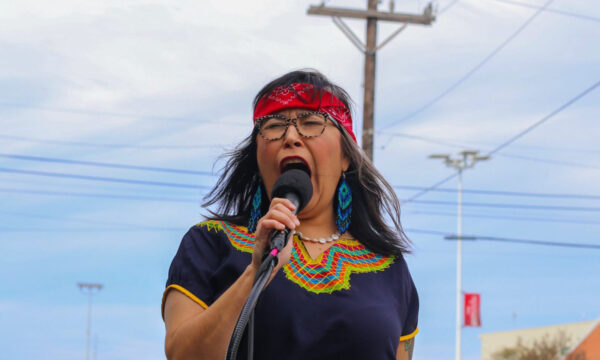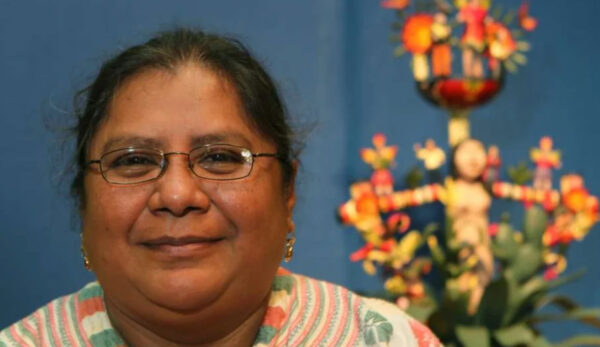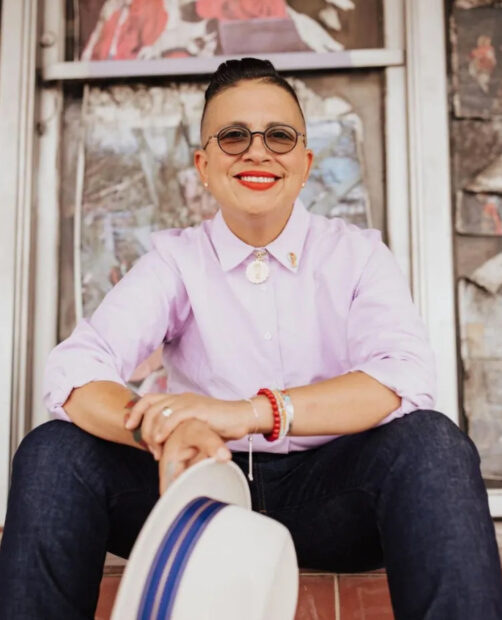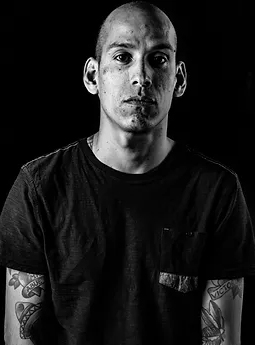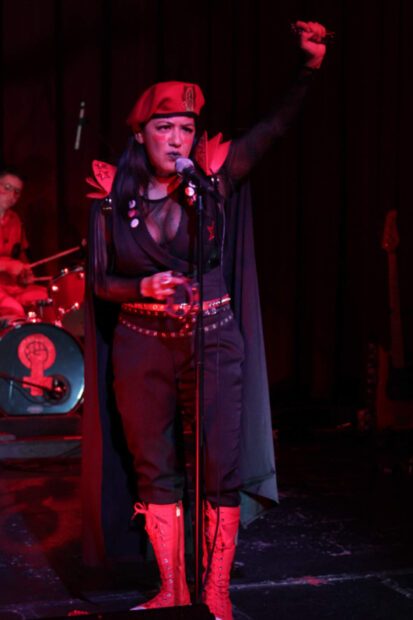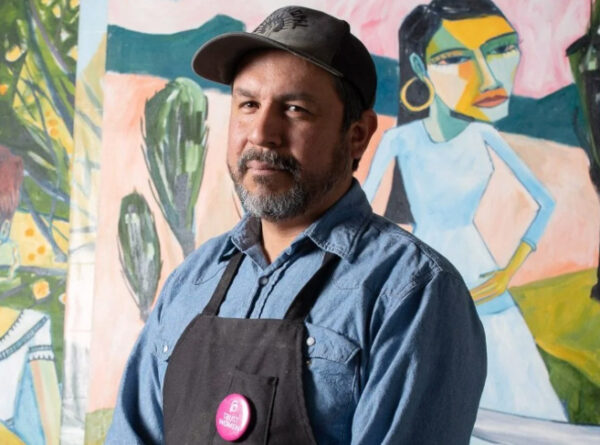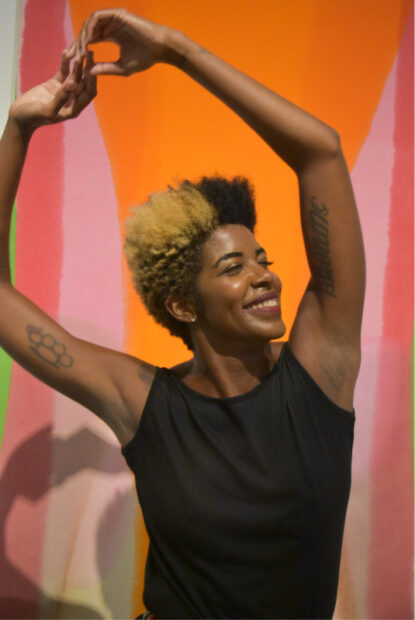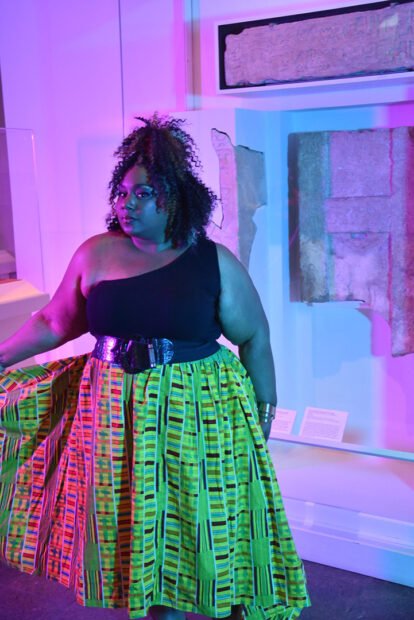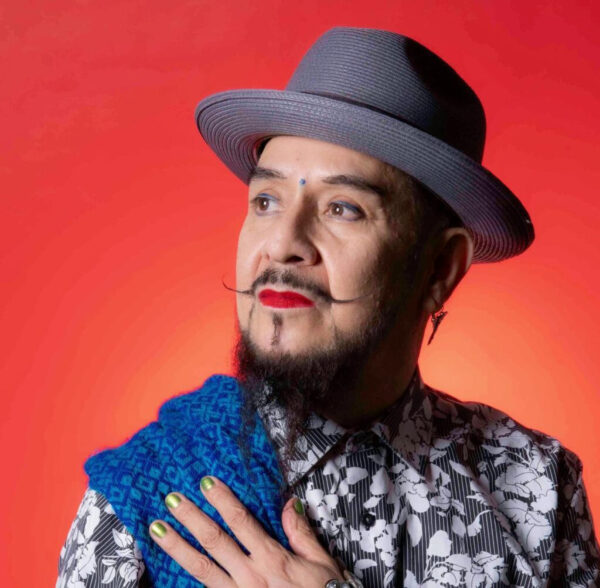Democratizing Racial Justice (DRJ), a research and creative scholarship project in San Antonio, has announced ten artists who will be participating in the inaugural year of its artist residency program.
Funded by The Andrew W. Mellon Foundation, DRJ builds on the legacy of social justice movements in San Antonio by partnering with local community-based organizations, some of which include the Esperanza Peace and Justice Center, the Alamo Colleges District, and the University of Texas at San Antonio (UTSA). DRJ was founded by Dr. Jackie Cuevas, Associate Professor and Interim Director of the Center for Women’s & Gender Studies at the University of Texas at Austin (UT), who formerly was an assistant professor of Latina/o Literary and Cultural Studies at UTSA; Dr. Rhonda Gonzales, Dean of the College of Arts, Humanities, and Social Sciences at the University of Denver, who previously served as the Chair of the History Department and Professor of History at UTSA; and Dr. C. Alejandra Elenes, Department Chair for UTSA’s Race, Ethnicity, Gender, and Sexuality Studies program.
In a press release, Dr. Elenes and Dr. Kirsten Gardner, DRJ’s Principal Investigators and Residency Coordinators, remarked, “The Democratizing Racial Justice project is centered on community collaborations that center social justice. The 2024 Artist in Residence program invited artists to propose projects that address issues of social justice through creative expression and theory. We are thrilled with the range of proposals and excited to fund these important projects.”
The selected artists are Marisela Barrera, Briana Blueitt, Veronica Castillo, Anel I. Flores, Andrei Rentería Menchaca, Amalia Ortiz, Cruz Ortiz, Tanesha S. Payne, Andrea “Vocab” Sanderson, and David Zamora Casas in partnership with Barbara Renaud Gonzalez. Learn more about the artists and their projects below via descriptions provided by DRJ.
Marisela Barrera, Lechuza Guide to the Lone Star State
Lechuza Guide to the Lone Star State is a new original performance focused on historical and living personajes de Tejas, with a focus on the Rio Grande Valley, San Antonio, and Dallas. Lechuza blends personal storytelling, Ms. Barrera’s particular style of jokes/rants, and a Ted Talk-like approach to Texas as told through a Tejana lens. Ms. Barrera will embody La Lechuza as she takes us through a tour of Texas, calling out the scenes rarely seen from a bird’s point of view. Lechuza dives into myth-making at its core, breaking down Texas stereotypes and misinformation to reveal true Tejana lore — stories of strength and resilience despite aggressive maneuvers to silence.
Briana Blueitt, Liberation Lineages: Linking Afro-Diasporic Fights for Land & Food Sovereignty
Briana Blueitt’s grandmother taught her that land is foundational to our long-term care.
Centering inherited lessons of care, craft, kin, and collective liberation, Liberation Lineages (working title) will focus on histories often omitted or distorted to challenge assumptions about Latinidad, Blackness, and Indigeneity, and connect shared histories and struggles. Ms. Blueitt draws from her time traveling, studying, and organizing between Texas and Mexico to visually link our shared histories and struggles with hopes to fuel and inspire cross-border movements toward land and food sovereignty necessary to resist ecocide and attempted erasure.
Veronica Castillo, Volver a la Tierra
Volver a la Tierra is a living installation with three components: a community consulta, an open-air community kitchen, and classes in clay sculpture and sustainability. The back patio of Galeria E.V.A. (Ms. Castillo’s gallery) will serve as an open-air mobile kitchen space where Castillo will lead cooking, nutrition, clay, and sustainability classes. Families will learn how to prepare a meal together, make their own dishes out of clay, and engage in practices of sustainability rooted in Indigenous traditions. Like Ms. Castillo’s work with clay, Volver a la Tierra reconnects people to the basic elements of life — tierra, agua, aire, y fuego (earth, water, air, and fire) and encourages a return to ways of living that respect and honor the Earth.
Anel I. Flores, Pintada de Rojo: A Hybrid Graphic Memoir About Love, and Love, and Love
Through a survey of Anel I. Flores’ multimedia visual art, illustrations, poetry, essay and other unnamed queer wonderings, Pintada is about understanding their life’s trauma through the love of writing and making art, connecting to source to come face to face with our inner child to understand our ancestors, our mother, our community, and more. Through writing and other creative acts, Ms. Flores hopes audiences can reconnect with and love ourselves enough to radiate healed, creative, good energy. In addition to working on Pintada, Ms. Flores will offer two to three Mico-Memoir Zine Making workshops to help others create their own Auto-Historia or Hybrid Memoir (Micro Size), encouraging participants to publish and present their zines at ZineFest 2024 at the San Antonio Public Library.
Andrei Rentería Menchaca
Andrei Rentería Menchaca will develop a chronicle that tells the individual stories of the members of Grupo VIDA (Victimas por sus Derechos en Acción/ Victims for their Rights in Action) — a citizen collective in the northern Mexican city of Torreón formed in response to narco terrorism by the Zetas Cartel. Since the group formed in 2015, hundreds of thousands of bone fragments in unmarked graves have been discovered. They continue to pressure Mexican authorities and search for their missing loved ones. For Mr. Renteria Menchaca, an activist-artist who has lived on both sides of the Rio Grande border, illustrating stories like Grupo VIDA’s are powerful reminders of existing parallels between divisions created by borders and those of discrimination, persecution, unlawful imprisonment, and other human rights abuses.
Amalia Ortiz and Las Hijas de la Madre, Punkera Diatriabas
Ortiz and their band, Las Hijas de la Madre, center border women’s voices and explore the correlation of Chicanx rasquachismo and the do-it-yourself nature of punk. Like punk, rasquachismo thumbs its nose at the ruling class while proudly creating something from nothing. A Chicanx feminist punk outcry for social change, Punkera Diatriabas will include new poemsongs, choreography and costumes, and a staged performance of Chicanx spoken word and punk music inspired by research and reflections on women in punk — a radical re-envisioning of a historically white, male expression Ms. Ortiz will challenge by utilizing an intersectional feminist lens.
Cruz Ortiz, CORRIDOS SUPER MAS FUERTE
CORRIDOS SUPER MAS FUERTE will continue the regional journalistic poetic ballad tradition in the Rio Bravo, West Texas, and Central Texas areas. Using a solar-powered mobile printing press trailer, ortiz will distribute live hand-printed corrido posters in six curated Tejanx towns and write and print corridos that reflect current social injustices, climate changes, and highlight Tejanx historical figures. The mobile trailer also comes equipped with a sound system and video projector, where loud cumbias and classic corridos can blast from the press, creating satellite healing spaces that share our stories from our perspectives and encourage gente to engage in real-time cultural and political situations.
Tanesha S.Payne, In the Well
In the Well (working title) is a multi-disciplinary work that uses performing and media arts to guide the audience through three vignettes: the first draws on experiences from the sit-ins of the Woolworth building in downtown San Antonio; the second, on contemporary happenings and issues; and the third vignette will utilize visionary fiction as a method to create a world we envision. Each vignette explores racial dichotomies of labels experienced through examples of civic (dis)obedience throughout time as Ms. Payne intends for audiences to walk away aware of the power that labels and gestures possess, recognize their connections to each of these components, and feel curious, informed, and empowered to create a world they dream of through their actions in a poetic way.
Andrea “Vocab” Sanderson, The Echo Project: Legacy Continues
Utilizing oral history practices, participants of The Echo Project will interview local leaders, activists, and teachers to learn about the history and intersections of their communities. Workshops led by experienced and diverse local artists will foster student development as they reflect on what they learned and forge a creative space with the freedom to speak about historical, cultural, and political issues that are personal, generational, and inherent to their communities. Writers will be paired with local artists who represent the diversity of San Antonio to enhance stories through dance, poetry, and visual art (to name some forms). Ms. Sanderson intends to conclude with live performances showcasing the multi-media art created that embody the words, quotes, and souls of community stakeholders and voice the beauty of their specific neighborhoods.
David Zamora Casas and Barbara Renaud Gonzalez, Lady Violencia and the Worship of Guns
David Zamora Casas and Barbara Renaud Gonzalez will co-organize a conference on violence. Local community leaders, educators, and activists will be invited to two separate platicas — one in San Antonio and the other in Uvalde — to deepen understandings about shared histories of Texas violence, provide tools for personal and collective resistance and resilience, and discuss the Uvalde mass shooting as an inevitable symptom of a violent society that impacts all, but especially the most vulnerable. Mr. Casas will provide the artistic ambiente to illuminate the Mexican/Indigenous roots critical to an awareness of non-violent possibilities, staging and performing an original story of one the intersecting victims of violence, the LGBTQ community, at the culmination of each platica.


